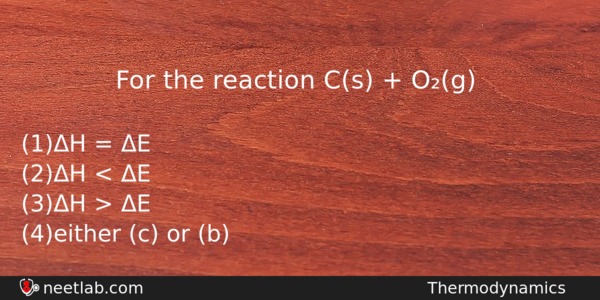| ⇦ | 
| ⇨ |
For the reaction C(s) + O₂(g)
Options
(a) ΔH = ΔE
(b) ΔH < ΔE
(c) ΔH > ΔE
(d) either ΔH > ΔE or ΔH < ΔE
Correct Answer:
ΔH = ΔE
Explanation:
In the reaction C(s) + O₂(g) → CO₂(g), there is no change in the number of moles of gaseous components (Δn = 1 – 1 = 0).
As ΔH = ΔE + ΔnRT. Thus in this case ΔH = ΔE.
Related Questions: - The electrolytic reduction of nitrobenzene in strongly acidic medium produces
- Which of the following reaction is endothermic
- Which of the following is not correct for D₂O
- The compound obtained by heating a mixture of ethyl amine and chloroform with
- The waxes are long chain compounds of fatty acids, which belong to the class of
Topics: Thermodynamics
(179)
Subject: Chemistry
(2512)
Important MCQs Based on Medical Entrance Examinations To Improve Your NEET Score
- The electrolytic reduction of nitrobenzene in strongly acidic medium produces
- Which of the following reaction is endothermic
- Which of the following is not correct for D₂O
- The compound obtained by heating a mixture of ethyl amine and chloroform with
- The waxes are long chain compounds of fatty acids, which belong to the class of
Topics: Thermodynamics (179)
Subject: Chemistry (2512)
Important MCQs Based on Medical Entrance Examinations To Improve Your NEET Score
18000+ students are using NEETLab to improve their score. What about you?
Solve Previous Year MCQs, Mock Tests, Topicwise Practice Tests, Identify Weak Topics, Formula Flash cards and much more is available in NEETLab Android App to improve your NEET score.
Share this page with your friends

Leave a Reply